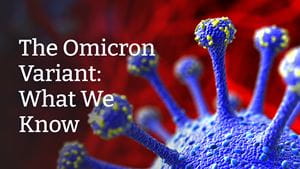
On November 24, 2021, the World Health Organization was alerted to a new variant of the COVID-19 virus that had begun to spread in South Africa. As more cases started to appear and scientists studied them more closely, the mutation was deemed a Variant of Concern. Labeled as B.1.1.529, the variant has been given the name ‘Omicron’ – the 15th letter of the Greek alphabet.
Emil Lesho, DO, and Edward Walsh, MD, are both infectious disease specialists with Rochester Regional Health. With decades of research experience, Dr. Lesho and Dr. Walsh continue to be two of the region’s foremost researchers in infectious diseases during the COVID-19 pandemic.
Sometimes called mutations, variants are copies of a virus that differ slightly from the original. Virus particles spread by getting inside of your body, latching onto your cells, and copying themselves. Sometimes when they are copying themselves, there is a mistake and a slight change is made – creating a new variant. The more a virus spreads, the more opportunities there are for new variants to emerge.
The Omicron variant, which was first discovered on November 9, 2021, has a “large number of mutations”, according to the WHO. Because of certain characteristics of its structure, the WHO is designating Omicron as a variant of concern. This means that it is:
In addition, the WHO believes that, compared to other COVID-19 variants, Omicron merits at least one of these changes at a global public health level:
The most significant difference between the Omicron variant and other COVID-19 variants is the number of mutations. Researchers at South Africa’s National Institute for Communicable Diseases (NICD) suggest it has similar mutations to the C.1.2, Beta, and Delta variants. However, researchers also identified that the Omicron variant has a large number of additional mutations.
Preliminary analysis by the World Health Organization also suggests this variant may have an increased risk of causing reinfection or infections in previously immunized persons.
Scientists are continuing to investigate the transmissibility of the Omicron variant as compared to other variants, so it remains unclear at this time. Dr. Lesho estimates we will know more definitive information in about one month.
Currently in the U.S., the Delta variant is the only variant of concern as designated by the SARS-CoV-2 Interagency Group (SIG). There are four classes of variants to track which ones could potentially have an impact on therapeutics, vaccines, and other viral treatments.
COVID-19 Variants: What’s Next and What’s Effective
At this moment, the CDC released a statement, stating no cases of the variant have been found in the U.S.
“There is a lot of information to be gathered about the Omicron variant,” Dr. Lesho said. “Until we can look at the data and better understand this latest variant of the virus, it is best to follow the most recent science we have about COVID-19.”
Based on the limited data we have so far about the existing cases, symptoms do not appear to be very different from other COVID-19 cases.
The symptoms typically seen in a COVID-19 diagnosis are:
The test most often used to confirm the presence of the COVID-19 virus is the PCR test.
Scientists at several different labs involved in researching the Omicron variant reported to the WHO that one of three target genes used in the PCR tests is not detected when running tests for the Omicron variant. This means that research labs should be able to identify more easily samples that contain the Omicron variant, which will allow it to be detected more rapidly than previous variants could be identified.
According to South Africa’s NICD, the mutations of the Omicron variant in particular could result in a vaccinated person’s immune system having a more difficult time fighting off an infection.
One statistic Dr. Lesho pointed to as a potential factor in the spread of the Omicron variant is that 24 percent of all people in South Africa are fully vaccinated against COVID-19. This is compared to just under 60 percent of the overall population of the United States.
Researchers said “it is likely that vaccines will still offer high levels of protection against hospitalization and death.” If a person wants to be fully vaccinated against COVID-19 by the Christmas holiday, they need to get their first dose during the week of November 28.
Pfizer-BioNTech and Moderna have said they will reformulate doses of their mRNA COVID-19 vaccines if the situation with the Omicron variant requires it.
“Regardless of what we learn about this variant, the current best line of defense against COVID-19 is to be fully vaccinated – including a booster dose if warranted – with one of the available vaccines,” Dr. Walsh said.
For now, the measures people can take to help prevent COVID-19 infection are similar to those the public has become familiar with over the last two years of the COVID-19 pandemic.
You can best protect yourself by: